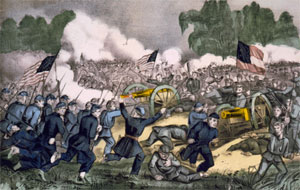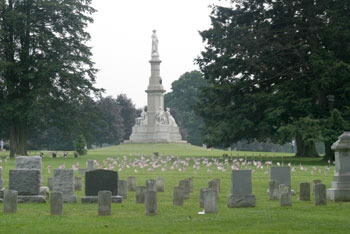
Source: Battle of Gettysburg, by Currier and Ives, Currier and Ives, Wikimedia
In this lesson, you have learned about parallelism and antithesis. Now it’s your turn to analyze the syntax of a text. Below you will find the text of the Gettysburg Address delivered by Abraham Lincoln on November 19, 1863, at the Soldier’s National Cemetery. Read Lincoln’s speech and answer the questions that follow.
Now we are engaged in a great civil war, testing whether that nation, or any nation so conceived and so dedicated, can long endure. We are met on a great battle-field of that war. We have come to dedicate a portion of that field, as a final resting place for those who here gave their lives that that nation might live. It is altogether fitting and proper that we should do this.
But, in a larger sense, we cannot dedicate—we cannot consecrate—we cannot hallow—this ground. The brave men, living and dead, who struggled here, have consecrated it, far above our poor power to add or detract. The world will little note, nor long remember what we say here, but it can never forget what they did here. It is for us the living, rather, to be dedicated here to the unfinished work which they who fought here have thus far so nobly advanced. It is rather for us to be here dedicated to the great task remaining before us—that from these honored dead we take increased devotion to that cause for which they gave the last full measure of devotion—that we here highly resolve that these dead shall not have died in vain—that this nation, under God, shall have a new birth of freedom—and that government of the people, by the people, for the people, shall not perish from the earth.

Source: Gettysburg national cemetery img 4164, Henryhartley, Wikimedia
 Using your notes, answer the questions below. Check your understanding when you are finished to see possible responses.
Using your notes, answer the questions below. Check your understanding when you are finished to see possible responses.
- Before we discuss syntax, write a short summary of Lincoln’s speech.
- What type of word pattern is Lincoln use when he says, “The world will little note, nor long remember what we say here, but it can never forget what they did here”? What effect does this syntax have on the audience?
- Identify the parallelism in the first sentence of the 2nd paragraph.
- What effect does Lincoln’s use of parallelism have on the speech?
- How is this speech organized? Why do you think it’s organized in this way?
Sample Responses:
- Lincoln begins with an allusion to the Declaration of Independence; then he explains that the country is engaged in a war to test whether it is really dedicated to the proposition that all men are created equal. Lincoln then reminds the audience that nothing can compare to the sacrifices of those who died so that the ideals of our nation might live. He ends with a promise that those who died will not have died in vain; the nation will go on.
- Antithesis. By putting opposite ideas side-by-side, he helps remind the audience that no one should ever forget the sacrifices of the soldiers who died at Gettysburg.
- “conceived in Liberty, and dedicated to the proposition”
- With the parallel phrases “we cannot dedicate—we cannot consecrate—we cannot hallow,” he emphasizes that memorializing those who fought is but a token in comparison to their sacrifices. Note “cannot” should not have space between the 2 “n’s.”
- He organizes his speech in this way so that listeners will make a connection between the Civil War and the Revolutionary War, and he suggests that the Civil War is a test. He has to promise that the dead did not die in vain in order for people to continue to support the war.